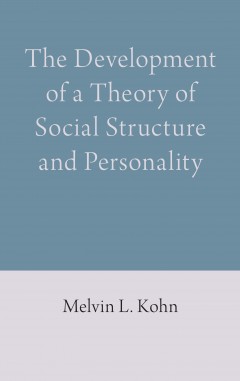The Development of a Theory of Social Structure and Personality
By Melvin L. Kohn
Other Formats Available:
E-Book- About This Book
- Reviews
- Author Information
- Series
- Table of Contents
- Links
- Podcasts
About This Book
In “The Development of a Theory of Social Structure and Personality,” Melvin Kohn reexamines his 60-year inquiry––conducted across distinct cultures under radically different conditions––into the relationship between people’s location in the social order and their personality. The result of this reexamination is an important refinement of Kohn’s highly regarded theory on the relationship between social class, work and personality, adding key insights about the role of political intervention on personality to his scholarship.
Over the course of his career, Kohn and his collaborators––in the United States, Norway, East and West Germany, Japan, Poland, Ukraine and China––used groundbreaking empirical methodologies to understand the effect of social structure on personality. Beginning in mid-twentieth century America, Kohn established that for employed men and women, the most important aspect of social structure for personality was social status. Kohn confirmed and refined this insight over time and across distinct cultural, economic and changing political conditions. Whether in postwar America, East and West Germany, industrial Japan, Communist Poland or post-Soviet Ukraine, study after study demonstrated the primacy of social class and social stratification in determining people’s values and orientations.
This research also revealed interesting cross-national inconsistencies in people’s reactions to similar social conditions. These inconsistencies did not change the essential relationship of social class and stratification to personality, and repeatedly confirmed Kohn’s findings about the importance of occupational self-direction and substantive complexity on all aspects of personality. In “The Development of a Theory of Social Structure and Personality,” Kohn focuses on these inconsistencies. Based on insights derived from research conducted during the transition to privatization of urban China, Kohn identifies political intervention as the force that modifies, for better or for worse, but does not eliminate the dominant effect of class stratification and the opportunities they provide for self-direction at work on personality.
Reviews
Author Information
Melvin L. Kohn, professor emeritus of sociology at the Johns Hopkins University, USA, and former chair of NIH’s Socio-environmental Studies Lab, has spent more than 60 years conducting ground-breaking cross-national research on the relationship between people’s location in the social order and their behavior.
Series
Table of Contents
1. Hagerstown and Schizophrenia; 2. Social Stratification and Parent-Child Relations in Washington, DC; 3. The Torino Study; 4. Men Employed in Civilian Occupations in the United States; 5. The Transformation of the Occupations Study into a Longitudinal Analysis; 6. Life on Sabbatical Leave in Norway and at the National Institute of Mental Health; 7. Class, Stratification and Personality; 8. Poland under Communism; 9. Occupational Self-Direction and Distress in Poland; 10. The Vietnam War, Nixon and Me; 11. Japan; 12. Germany––West and East; 13. Poland and Ukraine in Transition to Capitalism and Democracy; 14. The Presidency of the American Sociological Association, Ronald Reagan and My Job Switch; 15. My Two Exploratory Expeditions to China; 16. China in Transition to a Modern Economy; 17. Retirement, and My Last Sabbatical, at Deep Springs Junior College; 18. The Theory I Propose; Index.
Links
Stay Updated
Information
Latest Tweets



